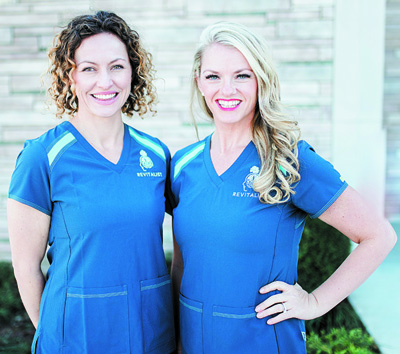Revitalist offering a new source of hope
 Nurse anesthetists Kathryn Walker, left, and Jennifer Hultz have opened Revitalist Clinic at 120 Huxley Road, to provide a breakthrough treatment in depression-related illnesses.
Nurse anesthetists Kathryn Walker, left, and Jennifer Hultz have opened Revitalist Clinic at 120 Huxley Road, to provide a breakthrough treatment in depression-related illnesses.
Hultz and Walker opened their practice, Revitalist Clinic, Feb. 14 at 120 Huxley Road, Suite 102, behind United Community Bank, which is off Kingston Pike.
Anesthesiologists have been using ketamine in surgeries for nearly 50 years as a fast-acting, non-barbiturate general anesthesia.
However, research has shown ketamine also has other benefits.
Ketamine infusion therapy can be used to treat major depressive disorder, post-traumatic stress disorder, anxiety, migraines, complex regional pain syndrome, fibromyalgia and other chronic, debilitating conditions.
“Many of these conditions are resistant to traditional therapy,” Walker said.
“This therapy, actually, has been proven to help the brain rebuild itself, rebuild pathways,” added Walker, who has been practicing in the Knoxville area since 2014. “We really think this can help a lot of people. Jenn and I really believe in helping people.
“We’re the first [such clinic] in Knox [County]. There are two similar clinics in Nashville and another in Johnson City.”
The clinic’s name, Revitalist, came about with the thought of “revitalizing your life,” Walker said, adding, “because this is someone’s second chance sometimes.”
“It’s really exciting,” said Hultz, who has more than 10 years of experience administering anesthesia. “The patients are so hopeful, and we are already seeing results. So, we’re just excited to be able to bring it to East Tennessee, to Farragut, to have it here and have something so close.”
Walker and Hultz first learned about the treatment while attending a 2017 meeting of American Association of Nurse Anesthetists, of which they are members.
Walker said she also had a friend with the Mayo Clinic who encouraged her to look into the ketamine therapy. “She was telling me about some advances they are having with this therapy they are seeing at the Mayo Clinic in Arizona,” Walker said. “The research is showing that it is really helping a lot of people where traditional [treatments] haven’t helped them in the past.
“When people get in a diseased state, the brain thinks it’s doing the right thing by duplicating the diseased pathway,” Walker said. “So, that’s why when we don’t get help sometimes — or we think we can do everything ourselves — everything gets worse.
“The brain is building diseased pathways,” she added. “So, what ketamine does is it goes in and it blocks a lot of these diseased pathways and it’s stimulating glutamate, a neurotransmitter — a certain chemical in our brain. Glutamate is what makes us smile.
“It’s naturally occurring, and it’s one of the biggest transmitters in our brain. The glutamate goes in and tells this growth factor in our brain to start rebuilding.”
Patients receiving the therapy will do a treatment regiment with the number of treatments depending on the illness, she said.
Then, subsequent infusions will spread out for when the patient needs treatment until, eventually, he or she will not need a treatment any more, she said.
“So, it’s not a chronic therapy that they will have to get,” she said.
While ketamine has been an abused drug in the past with dosages about 800 percent higher than patients receive at Revitalist, Walker said patients “won’t become addicted at [the clinic’s] low doses.”
The clinic also does not dispense ketamine for patients to take home — they only can receive the therapy in the office — and to receive treatment, the business requires a referral from a physician or the patient’s medical records from an outside provider.
The clinic is open from 8 a.m. to 6 p.m., Monday through
Friday, and from 8 a.m. to noon, Saturday.
For more information about Revitalist, call 865-329-6262 or visit its website at revitalistclinic.com.
“It’s a very strict protocol we have in order to make the best of the situation for patients and providers,” Walker said. “We want them to come here with a pre-existing diagnosis that we’re treating.”
”And, ketamine is not a first-line treatment for depression. It is recommended, as if you try these other things and the other things don’t work, then try this.”
Along with the ketamine therapy, the clinic provides vitamin infusions.
While people cannot simply walk in for a ketamine treatment, they can walk in for a vitamin infusion, she said.
Right now, insurance in Tennessee does not cover the treatment, but Health Savings and Flexible Spending accounts will reimburse the costs.


